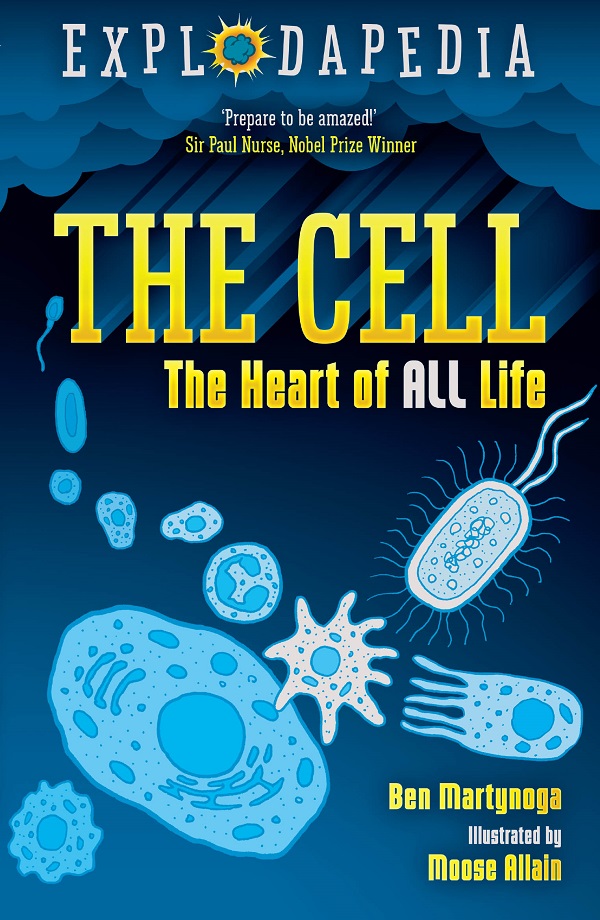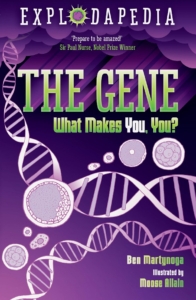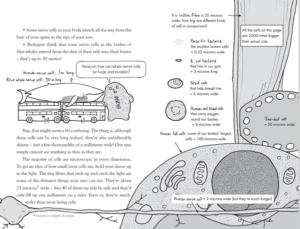
Explodapedia – an explosion in non-fiction
David Fickling Books have created a new approach to non-fiction. Their new Explodapedia series is ‘an exploded encyclopedia’ they say, that takes key scientific subjects and presents them in a way that’s entertaining and readable, whilst still providing reliable, serious, in- depth information that will help readers gain a true and lasting understanding of crucial topics. We asked David Fickling to tell us more.
 The Explodapedia is a labour of love for the curious child. It is a dream that can come true. It will never belong to anyone nor any culture and is from the start a thing for us all to share. It will likely be many years before it is full grown, and in one sense it will never be finished. In this it is like the World Wide Web as described by its inventor Tim Berners Lee. But unlike what is on the internet the Explodapedia must be scientifically reliable and trusted by its readers. Of course, it must also be entertaining and effortlessly readable. Making and publishing the Explodapedia is more like planting an ever-living tree than building a house. It will grow from the bottom up and become a light and airy framework full of reliable information and accessible knowledge for young people of all backgrounds and societies all over the world. It cannot be built by one person, nor one people, and will need the cheerful commitment and cooperation of many highly able and talented people, writers, illustrators, teachers, academics from all over the world and, if you are willing, YOU as well, you who are reading this article today. No one can know what the Explodapedia will become, nor should they. It is nothing less than a joint effort to introduce all knowledge of all science to children.
The Explodapedia is a labour of love for the curious child. It is a dream that can come true. It will never belong to anyone nor any culture and is from the start a thing for us all to share. It will likely be many years before it is full grown, and in one sense it will never be finished. In this it is like the World Wide Web as described by its inventor Tim Berners Lee. But unlike what is on the internet the Explodapedia must be scientifically reliable and trusted by its readers. Of course, it must also be entertaining and effortlessly readable. Making and publishing the Explodapedia is more like planting an ever-living tree than building a house. It will grow from the bottom up and become a light and airy framework full of reliable information and accessible knowledge for young people of all backgrounds and societies all over the world. It cannot be built by one person, nor one people, and will need the cheerful commitment and cooperation of many highly able and talented people, writers, illustrators, teachers, academics from all over the world and, if you are willing, YOU as well, you who are reading this article today. No one can know what the Explodapedia will become, nor should they. It is nothing less than a joint effort to introduce all knowledge of all science to children.
The Explodapedia has the brilliance of an old-time encyclopaedia exploded into single books on every topic under the sun and beyond it. You should first think of the Explodapedia in three dimensions!
Think of a lattice, a network, with a title at every node. The enormous labour of making an old-time encyclopaedia doesn’t make economic sense anymore. But the need for young readers and their support networks, families and schools to have immediate access to readable, trustworthy texts and deep knowledge of the world easily at hand and directly has never been more urgent. The internet is not trustworthy and cannot be trustworthy. Single unconnected volumes will not do the trick. We desperately need the Explodapedia for our children. When it is in place the readers can follow their own interests their own imaginations. They will create the demand for new titles. The Explodapedia will not be built from the top down or deliver information from above it will be demanded by the questing minds of its young readers. Who knows where their knowledge and their discoveries will take us?
But let’s not get ahead of ourselves. DFB is delighted to start the Explodapedia rolling and exploding in 2023. We thought about it a lot and decided that the best place to start is in the life sciences, such an important and creative focus for humanity right now. So important that our children growing up in the world today can understand the terrifying issues that face them from climate change to AI. Knowing what life is must be a first step in being able to make the right decisions to preserve our planet and all its life. This is knowledge that our children deserve. And it’s our hope that the Explodapedia can deliver it at a much greater depth than a school textbook spreading its knowledge so thinly ever can. In Ben Martynoga we have found a young scientist who writes lively prose wonderfully well and clearly and in Moose Allain the perfect foil as an illustrator of clarity and quirk. We hope you love the first books in the Explodapedia as much as we do.
The first two books in the Explodapedia series are out now, The Cell, 9781788451918, and The Gene, 9781788452458, £7.99 each, pbk.






